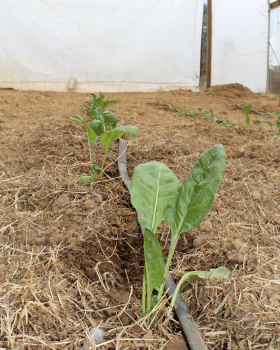By Hakeem Holmes [1], NCAT Agriculture Specialist
Ever notice how farming is a bit like riding a rollercoaster? You’ve got all these twists and turns that are totally out of your hands—weather, markets, who knows what else—but they can make or break your year. That’s why being agile isn’t just a buzzword for farmers; agility is necessary for building a farm that can roll with the punches and actually come out stronger.
Think of it this way: Agility means your farm can pivot to grab those good opportunities when they pop up, then switch gears to minimize the hit when things get tough. If you’ve already done some strategic planning and figured out your farm’s strengths, weaknesses, opportunities, and threats (SWOT, right?), then you’re halfway there. Earlier this year, we explored some short-term agility strategies in this blog [2]. Now let’s look at the long-term game plan to help you stay flexible for years to come.
Long-term agility strategies should be woven into the fabric of your farm’s mission and direction. Below are some concepts to consider along with example scenarios to help you plan for long-term success.
Strategic Sensing: The ability to perceive and interpret emerging long-term trends, potential disruptions, and evolving market demands in the agricultural landscape.

Vegetable starts growing alongside a drip irrigation tape in a high tunnel. Photo: Nina Prater
- Scenario: A specialty crop farmer has been following reports and attending webinars on the potential impacts of climate change on water availability in the region over the next 5-10 years.
- Agility in Action: Anticipating potential water restrictions or increased costs, the farmer gradually invests in drip irrigation and rainwater harvesting systems. This provides them with more control and flexibility in water management as droughts become more frequent .
Robust Strategic Planning: The development of comprehensive long-term plans and contingency measures that consider various potential future scenarios.
- Scenario: A farmer has developed a detailed five-year business plan that includes potential responses to risks like pest outbreaks, labor shortages, and changes in consumer preferences.
- Agility in Action: An unexpected labor shortage arises due to a localized health issue affecting seasonal workers. The long-term financial plan of the farm allocated some reserves for unforeseen operational expenses, allowing the farmer to offer slightly higher wages temporarily to attract replacement workers quickly.
Rapid Execution and Operational Planning: The ability to quickly translate strategic insights and long-term plans into concrete short-term actions and adjust operational plans in response to immediate needs.
- Scenario: Strategic sensing indicated a growing interest in agritourism in the area. A farmer had a long-term goal of potentially offering farm tours or workshops and has built communications channels (social media, email list) to communicate directly with customers to work toward this goal.
- Agility in Action: When a local tourism agency unexpectedly promotes “farm-to-table experiences” and requests participating farms on short notice, the farmer can leverage their existing communication channels to inform potential visitors about the new offering on short notice. This ability to quickly implement a long-term idea allows them to capitalize on the unexpected opportunity.

Being agile allows you to hop on opportunities that may arise in your area. Photo: Danielle Miska
Adaptivity: The overall capacity of the farmer to learn from experience, adjust strategies and operations in response to both short-term shocks and long-term changes, and embrace innovation.
- Scenario: A farmer experiences an unexpected and significant increase in a specific pest that their usual organic control methods are not effectively managing.
- Agility in Action: The farmer uses an alternative organic-approved integrated pest management (IPM) strategy that is costly but is known to be more effective at handling large infestations quickly. By keeping records of sources of the IPM inputs for his organic certification inspection, the farmer can refer to these records to quickly react and source these materials again if there is another large infestation in the future.
Embracing agile farm management is key to building resilience and capitalizing on opportunities in agriculture. For farmers and ranchers, establishing an agile management system fosters both resilience in the face of unpredictable challenges and the nimbleness to leverage new opportunities. By proactively considering external factors such as government policies, weather events, and market dynamics – inevitable influences on farms of all scales – agricultural operations can develop adaptable long-term strategies, turning potential disruptions into catalysts for enduring success.
 Click
here to print
Click
here to print